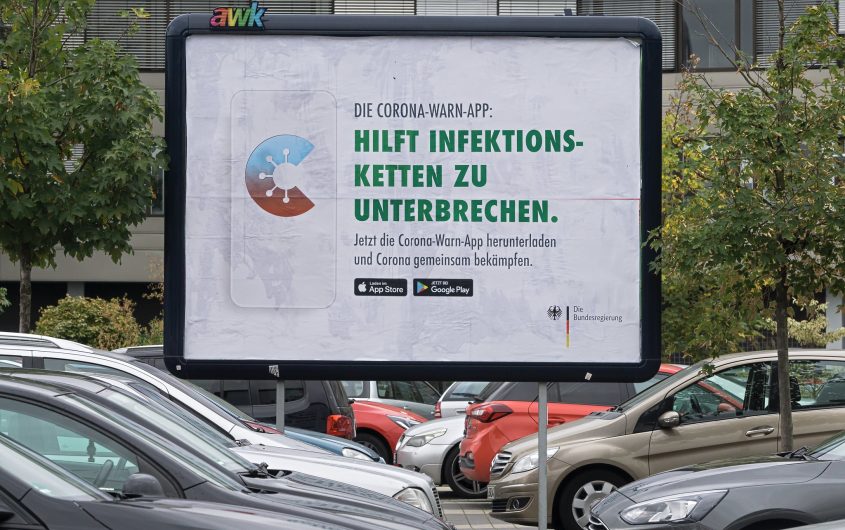
7C0 via Flickr
Corona-Warn-App and Germany’s Efforts to Tame COVID-19

Zhijiang Zhao
Research Intern
Zhijiang Zhao is a research intern at AICGS for Fall 2020. He supports fellows with research, monitors the news for articles related to AICGS’ research agenda, manages the outreach database, and writes for the Institute’s website.
Zhijiang recently completed his MA in German and European Studies at Georgetown University’s Walsh School of Foreign Service. He is interested in China and the future of transatlantic relations, artificial intelligence, and German history.
Zhijiang was an exchange student at the University of Mainz from 2016 to 2017. He interned at a local history research institute. He also lived in Berlin for a while, where he helped with Sarah Lawrence College’s summer art program. Zhijiang speaks Mandarin and German. He is learning French.
Germany has been lauded as one of the world’s leading countries with regard to the tackling of the COVID-19 pandemic. In the first wave of this crisis, Germany managed to keep its death rate low despite having a huge number of cases, while France, Italy, and Spain saw much higher fatality rates. After a comparatively restful summer with a low number of infections, in recent weeks Germany has recorded significant spikes in new COVID-19 cases. Chancellor Angela Merkel warned that Germany is in a critical moment that can determine the outcome of the nation’s virus fight. She called on Germans to show solidarity and restraint in this “serious phase” of the pandemic.
In its approach to COVID-19, Germany has leveraged digital contact tracing to break the chain of infections. Under contract with the federal government, SAP and Deutsche Telekom co-developed and launched a smartphone application called the Corona-Warn-App in June. Without disclosing users’ names and locations, the app uses Bluetooth to send out encrypted random codes when two or more users approach each other. The codes can tell people for how long they were in contact and how far apart they were. They are collected in a decentralized manner and the data will automatically be deleted after fourteen days. If a user tests positive for COVID-19, he or she can let the app notify those close contacts. The Corona-Warn-App works in the background and turns users’ smartphones into warning systems without draining the phones’ batteries. By late October the app has been downloaded roughly 20 million times. “People want it, it works, and it is helping prevent infections,” said health minister Jens Spahn optimistically at the “100 days of the Corona-Warn-App” event. In contrast, Bavarian minister-president Markus Söder bluntly called the app a “toothless tiger” because he saw it as having hardly any warning effect.
The Corona-Warn-App certainly is a useful tool to contain COVID-19 but it still has a long way to go to become truly effective. Although the government has hailed the app as a success based on the large download number, experts argue still too few people are using the app. Veronika Grimm from the German Council of Economic Experts thinks that the result of the app will only be promising if 80 percent of German citizens use it. This goal is difficult to reach because there are lingering fears among the public regarding potential infringement on personal privacy. Shortly before the release of the Corona-Warn-App, a survey showed only 56 percent of Germans would use a smartphone app designed to contain the COVID-19 pandemic; 42.8 percent of respondents were worried about potential government monitoring beyond the course of the pandemic; and 40.2 percent fear unauthorized data access by unknown actors. Only 25.2 percent express no concerns about the smartphone app at all. Finding the right balance between data security and COVID-19 traceability has become one of the main challenges for Germany to deal with the pandemic. The federal government has stressed that the use of the Corona-Warn-App is fully voluntary, and the app complies with the national privacy laws. Nonetheless, some Germans are still cautious about their personal privacy and are not persuaded by the government’s assurance.
The public’s effort to report new cases has been tepid. According to the President of the German Medical Association Klaus Reinhardt, only 60 percent of the people who have tested positive for COVID-19 enter their tests into the system. Why don’t 40 percent do it? Reinhard said the government and health officials should convince people that there are no disadvantages to them if they report testing results, and active reports are crucial measure to interrupt the contagion chains.
Design failures and technical glitches also diminished the initial enthusiasm of people who download the app for the public good. User reviews on the Google Play store show many users have experienced problems such as app crashes, error messages, and unresponsive push notifications. Although the developers have updated the app multiple times to address user concerns, to many people the Corona-Warn-App still appears to be a complicated nuisance rather than a helpful health alert tool.
Germany is now experiencing a second wave with a growing number of COVID-19 infections. Many health experts believe the app will gain in prominence as people want to stay healthy and safe in the coming months. The more people begin to use the app and report testing results, the better the public health system can map out virus transmissions. The German government should continue to address citizens’ concerns about personal privacy. While data protection activists such as Malte Spitz from the Henrich Böll Foundation praise the transparency of the German government regarding the use of this app, many Germans are cautious about their personal data simply out of habitual reflection of the national privacy culture deeply rooted in Germany’s historical experience with state surveillance in the twentieth century. In order to create trust, the government needs to engage in earnest dialogues with its citizens, assuring them its commitment to protect data security and civil rights, as well as public health. The designers of the Corona-Warn-App, on the other hand, should watch for technical glitches, and monitor the GitHub repositories they created for users’ feedback and new features advice. Timely solutions to problems will build users’ confidence to use the Corona-Warn-App as a tool to protect themselves and others during the pandemic.








